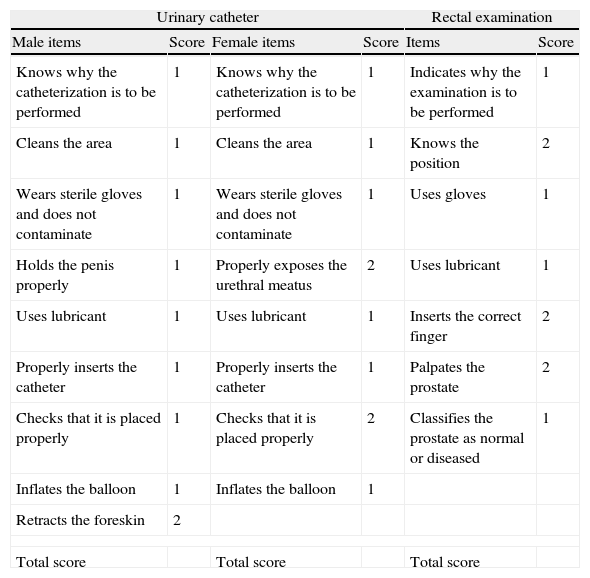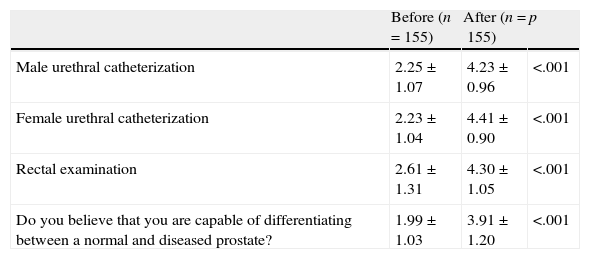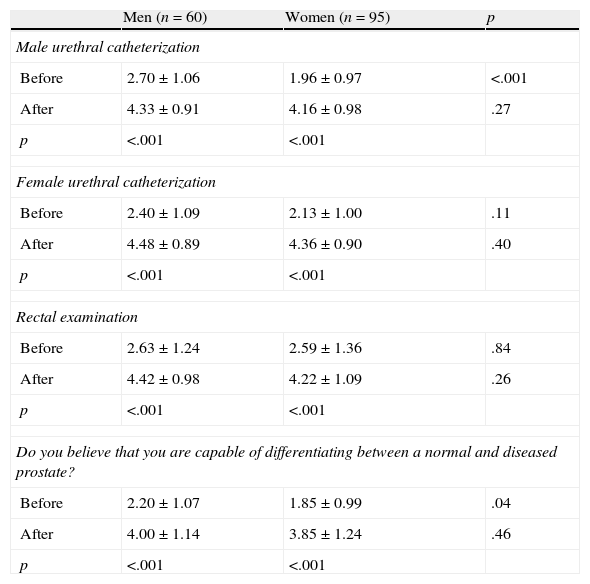To know the level of confidence of fifth-year medical students in order to perform maneuvers in bladder catheterization and rectal examination before and after training with simulators. To be able to assess student satisfaction regarding the use of the simulation as a learning method.
Materials and methodsThe study was conducted in the Simulation Center of the Faculty of Medicine. A total of 173 students who completed a practical workshop on the subject of Urology participated. The students were asked to answer anonymous questionnaires on their level of confidence in performing a bladder catheterization and rectal examination before and after the workshop as well as their satisfaction in using the simulation as a training tool. The workshops were organized using groups of 10 students. A teacher or a resident in that area of expertise supervised each student individually, resolving their doubts and teaching them the proper technique.
ResultsAll the evaluations made on the different abilities were significantly higher after training (p<.001). Significant differences were found in the confidence level between men and women before the training regarding male urethral catheterization maneuvers and recognition of normal or pathological prostate, The confidence level was lower in women (p<.05). These differences disappeared after training. The level of overall satisfaction with the workshop was high, going from 4.47±0.9 to a maximum score of 5.
ConclusionsSimulation is a training method that helps improve the confidence of the medical student in performing a bladder catheterization and digital rectal examination.
Conocer el grado de confianza de los alumnos de quinto de grado en Medicina para realizar las maniobras de sondaje vesical y tacto rectal, antes y después del entrenamiento con simuladores. En segundo lugar valorar la satisfacción de los estudiantes respecto a la utilización de la simulación como metodología de aprendizaje.
Material y métodosEl estudio se llevó a cabo en el Centro de Simulación de la Facultad de Medicina, y participaron los 173 estudiantes que realizaron el taller práctico de la asignatura de Urología. Mediante cuestionarios anónimos los estudiantes respondieron a preguntas sobre su grado de confianza en la realización del sondaje vesical y el tacto rectal, antes y después del taller, y sobre la satisfacción general respecto a la simulación como herramienta de entrenamiento. Los talleres se organizaron en grupos de 10 alumnos y estaban dirigidos por un profesor o residente de dicha especialidad que supervisaba de manera individual, resolvía dudas e instruía en la técnica correcta.
ResultadosTodas las valoraciones respecto a las distintas competencias fueron significativamente más altas tras el entrenamiento (p<0,001). Se encontraron diferencias significativas en la confianza antes del entrenamiento entre varones y mujeres en la maniobras de sondaje uretral masculino y reconocimiento de próstata normal o patológica, siendo menor la confianza en mujeres (p<0,05). Estas diferencias desaparecieron tras el entrenamiento. El grado de satisfacción general con el taller fue alto, de 4,47±0,9 sobre una puntuación máxima de 5.
ConclusionesLa simulación es un método de entrenamiento que mejora la confianza del estudiante de Medicina en la práctica del sondaje vesical y tacto rectal.











